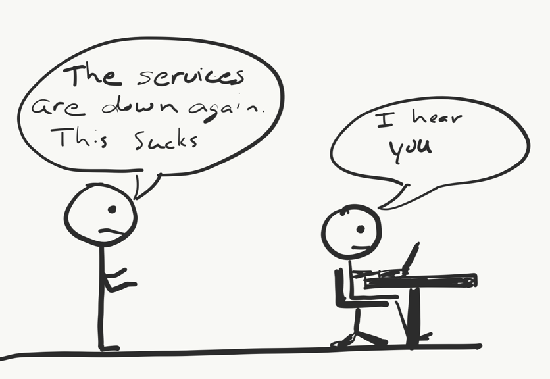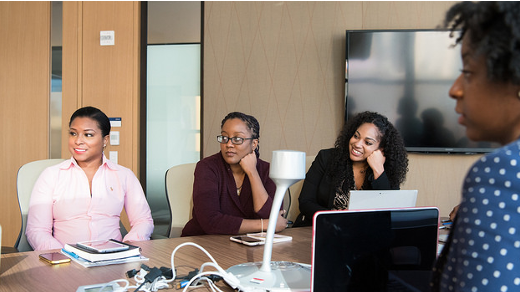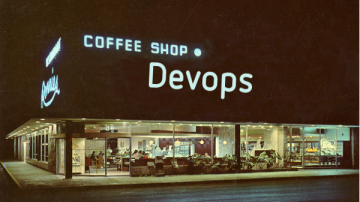In my kitchen, we have a sign that reads "Marriage is more than finding the right person. It is being the right person." It serves as a great reminder of the individual responsibility everyone has in any healthy relationship. As organizations adopt DevOps as a model of developing and delivering value to customers, the impact of healthy relationships is extremely important for success.

Historically, the relationship between development and operations teams has been unhealthy. Poor communication, limited empathy, and a history of mistrust make merging these teams into a tighter operating model challenging, to say the least. This is not entirely unfair to either side.
Developers have long been frustrated by lead times and processes put in place by the operations organization. They just want to work, and they often see operations as an anchor on the ship of progress.
Operations professionals have long been frustrated by the impatience and lack of clear requirements that come from development teams. They are often confused about why those teams are not able to use the available services and processes. They see developers as a liability to their ability to maintain stable services for customers and the business.
A lingering gap here is that each side has been focused on protecting its own perspective. They emphasize how the other team is not being what they need, and they never question whether they, too, could be doing something different.
In DevOps, all sides must frame their role in the organization based on how they add value to others.
There are a few things that everyone, including managers and leaders, can do right away to become a better contributor and partner in their DevOps relationships.
Communicate
Most professionals in an organization adopting DevOps find themselves needing to work closely with new people, ones they have had limited exposure to in the past. It is important for everyone to take time to get to know their new teammates and learn more about their concerns, their interests, and also their preferred communication style.
Successful communication in new relationships is often built on simply listening more and talking less. Our natural tendency is to talk about ourselves. Most people love sharing what they know best. However, it is extremely important to make more room to listen.
Hearing someone is not the same as listening to them. I'm confident that we have all been in the situation where someone expresses a concern that we do not entirely internalize. Also, merely hearing does not encourage people to share–or to share as completely as they should.

It is important to listen actively. Repeat what you hear, and seek validation that what you repeat is what they wanted you to understand. Once you understand their concern, it is important to make your initial response a selfless one. Even if you can't completely solve the problem, demonstrate sympathy and help the person move towards a solution.

Selflessness
Another key relationship challenge as organizations adopt DevOps is developing a perspective of selflessness. In DevOps, most people are responsible for delivering value to a wide variety of other people. Each person should begin by considering how their actions and work impact other people.
This service mindset carries forward when you become more sensitive to when others are in need and then dedicate time in your schedule specifically for the purpose of helping them. This can be as simple as creating a small improvement in a process or helping to troubleshoot an issue. A positive side effect is that this effort will provide you more opportunities to work with others and develop deeper trust.
It is also important not to hoard knowledge—either technical or institutional—especially when people ask questions or seek help. Maintain the mindset that there are no stupid questions.

Finally, selflessness includes being trustworthy. It is difficult to maintain a healthy relationship when there is no trust. Be honest and transparent. In IT, this is often seen as a liability, but in DevOps it is a requirement for success.
Self-care
In order to be a strong contributor to a relationship, it is necessary to maintain a sense of self. Our individuality provides the diversity a relationship needs to grow. Make sure you maintain and share your interests with others. Be more than just the work you do. Apply your interests to your work.
You are no good to others if you are not good to yourself. Healthy relationships are stronger with healthy people. Make sure you take time to enjoy your interests and recharge. Take your vacation and leave work behind!

I am also a strong advocate for mental health days. Sometimes our mental health is not sufficient to work effectively. You're not as effective when you are physically ill, and you're not as effective when your head is not 100%. Work with your manager and your team to support each other to maintain good mental health.
Mental health is improved by learning. Invest in yourself and expand your knowledge. DevOps ideally needs "t-shaped" people who have depth on a topic and also broader system knowledge. Work to increase your depth, but balance that by learning new things about your environment. This knowledge can come from your teammates and create operational sympathy.

Finally, healthy relationships are not all work and no play. Take time to acknowledge the successes of others. If you know your team, you likely know how individuals prefer to receive praise. Respect those preferences, but always strive to praise vocally where possible.

Make sure to celebrate these successes as a team. All work and no play makes everyone dull. Celebrate milestones together as a team, and then articulate and target the next objectives.
Be the right person
DevOps requires more from every individual, and its success is directly tied to the health of relationships. Each member of the organization should apply these techniques to grow and improve themselves. A focus on being the right person for the team will build stronger bonds and make the organization better equipped to reach its goals.
This article is based on a talk Josh Atwell gave at All Things Open 2019.









6 Comments